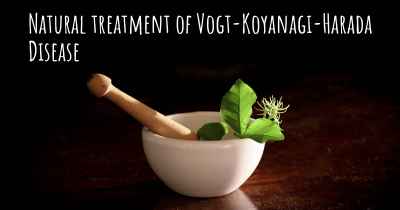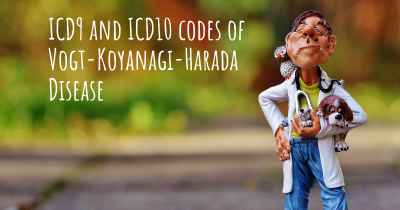Vogt-Koyanagi-Harada Disease diet. Is there a diet which improves the quality of life of people with Vogt-Koyanagi-Harada Disease?
Are you aware of a diet that can improve the quality of life of people with Vogt-Koyanagi-Harada Disease? Is there a diet that is suggested to avoid when having Vogt-Koyanagi-Harada Disease? See if there is a diet that can improve the quality of life of people with Vogt-Koyanagi-Harada Disease, recommended and to avoid food when having Vogt-Koyanagi-Harada Disease

Vogt-Koyanagi-Harada Disease Diet: Improving Quality of Life
Vogt-Koyanagi-Harada (VKH) disease is a rare autoimmune disorder that affects various body systems, including the eyes, skin, and central nervous system. While there is no specific diet that can cure or treat VKH disease, adopting a healthy and balanced diet can help improve the overall quality of life for individuals living with this condition.
The Role of Nutrition in VKH Disease
Proper nutrition plays a crucial role in supporting the immune system and overall well-being. Although diet alone cannot reverse the effects of VKH disease, it can help manage symptoms, boost energy levels, and support overall health. Here are some dietary considerations that may be beneficial:
1. Anti-Inflammatory Foods
VKH disease involves inflammation of various body systems, including the eyes. Including anti-inflammatory foods in your diet may help reduce inflammation and alleviate symptoms. These foods include:
- Fatty Fish: Rich in omega-3 fatty acids, fish like salmon, mackerel, and sardines have anti-inflammatory properties.
- Colorful Fruits and Vegetables: Berries, leafy greens, tomatoes, and bell peppers are packed with antioxidants and anti-inflammatory compounds.
- Healthy Fats: Avocados, olive oil, and nuts are excellent sources of monounsaturated fats, which have anti-inflammatory effects.
- Spices: Turmeric, ginger, and cinnamon have natural anti-inflammatory properties and can be incorporated into various dishes.
2. Nutrient-Dense Foods
Ensuring your diet is rich in essential nutrients can support overall health and strengthen the immune system. Focus on incorporating the following nutrient-dense foods:
- Lean Proteins: Include sources like poultry, fish, legumes, and tofu to provide essential amino acids for tissue repair and immune function.
- Whole Grains: Opt for whole grains like quinoa, brown rice, and whole wheat bread, which provide fiber, vitamins, and minerals.
- Dairy or Dairy Alternatives: Choose low-fat dairy products or fortified plant-based alternatives to ensure adequate calcium and vitamin D intake.
- Colorful Fruits and Vegetables: These provide a wide range of vitamins, minerals, and antioxidants necessary for overall health.
3. Hydration
Staying hydrated is essential for everyone, including individuals with VKH disease. Drinking an adequate amount of water helps maintain overall health and supports the body's natural functions. Aim to drink at least 8 glasses of water per day, and adjust your intake based on your activity level and climate.
Additional Considerations
While a healthy diet is important for individuals with VKH disease, it is equally crucial to consider other aspects of lifestyle management. Here are some additional considerations:
1. Medication and Treatment
Follow your healthcare provider's prescribed treatment plan, which may include medications to manage inflammation and other symptoms. Diet should complement medical treatment, not replace it.
2. Stress Management
Stress can exacerbate autoimmune conditions like VKH disease. Engage in stress-reducing activities such as meditation, yoga, deep breathing exercises, or hobbies that bring you joy.
3. Regular Exercise
Physical activity can help improve overall well-being and boost the immune system. Consult with your healthcare provider to determine suitable exercises based on your individual condition and limitations.
4. Regular Eye Exams
Regular eye exams are crucial for monitoring the progression of VKH disease and managing any ocular complications. Follow your ophthalmologist's recommendations for check-ups and treatment.
5. Support Network
Connect with support groups or organizations that specialize in autoimmune diseases. Sharing experiences and knowledge with others facing similar challenges can provide emotional support and valuable insights.
Note: It is important to consult with a healthcare professional or a registered dietitian before making any significant changes to your diet or lifestyle, especially if you have VKH disease or any other medical condition.
While a specific diet cannot cure VKH disease, adopting a healthy and balanced eating plan can contribute to overall well-being and potentially alleviate some symptoms. By incorporating anti-inflammatory and nutrient-dense foods, staying hydrated, and considering other lifestyle factors, individuals with VKH disease can improve their quality of life and better manage their condition.








